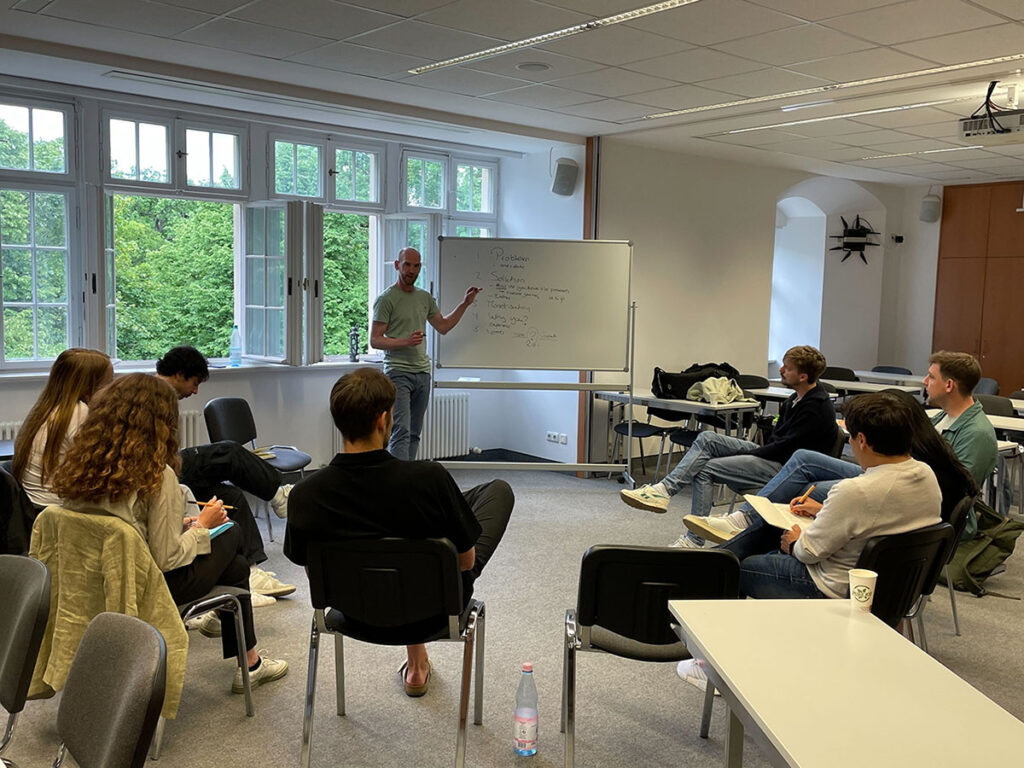It doesn’t matter if you are a student or a professional, if you work in entrepreneurship, management, marketing or other fields, communication will always be the backbone of your success.
“People are looking to commercialise their own workforce, skills, and abilities – much like a startup does”, says René Mauer, European Coordinator of the Jean-Baptiste Say Institute.
Being able to present yourself, to sell yourself, has become a fundamental capacity in nearly every field of work. Improving your public speaking skills also teaches you to listen actively and create messages that stick with people.
These skills are especially crucial for entrepreneurs, as the viability of their careers depends on their ability to pitch. To provide students and founders with tools and frameworks to pitch their best, the Jean-Baptiste Say Institute of ESCP Business School hosted a workshop with public speaking coach Bjørn de Wildt.

Where to start to improve your public speaking and pitch your best
Born in Norway, Bjørn de Wildt has been working with theatre methods to speak in public since 2009. Starting his career in social-cultural development, he first came in contact with theatre techniques while doing social work and decided to pursue the topic further with studies in theatre.
When he began his job as a drama teacher in universities in the Netherlands, students asked for his help with presentations, which eventually led him to develop a programme to apply theatre techniques to overcome the fear of public speaking.
Not long after that, he met the startup world and the utility of public speaking skills for entrepreneurs. Via both in-person and online formats, Bjørn applies his 10+ years’ worth of knowledge and experience to help individuals improve their public speaking. Above all, he focuses on creating a safe environment for people to experiment and try things freely.
At the start of his workshop, Bjørn explains that the first question to ask yourself before preparing a speech or presentation is: “what do you want your audience to experience?”. He constantly reminds his students to question what they are saying and how they are saying it.
According to his experience, when presenting we need to forget about what we want to say and focus on why we want to deliver this message and how to say it, in order for the audience to receive it in the best possible way. This is the foundation of good public speaking.
A list of tips and tricks won’t turn you into a great public speaker, but these lessons may help
People must focus on “learning who [they] are as presenters, and making the best out of that”, says Bjørn. No need to watch a thousand TedTalks and try to perfectly imitate your favourite speaker: it’s not gonna work. “You are you”, he says, so you must “use what you have to deliver”.
Throughout his career, Bjørn has noticed how people hide behind preconstructed frameworks – truly progressing as a presenter is about showing and embracing oneself.
No matter the situation, however, Bjørn has a few lessons that can be applied:
- Active suggestions: instead of having people focus on what they want to avoid, he pushes them to concentrate on what they want to do, what they want to convey.
- Use all five senses to activate the listener and build suspense: a message is only going to go through when an emotional connection is built.
- Get unstuck: stress builds up in a still body, so it is fundamental to keep moving, preparing the body as if public speaking were a sport. This helps tremendously with managing stress and anxiety: the idea is to use the energy these feelings give you by redirecting it to what you are actually doing.
- Perceive your body as a tool, using hands, face and voice expressions. It is fundamental to avoid protecting our chest, wrists, palms and neck, as this hinders the confident transmission of the message.
And last, but not least, the elevator pitch
In his workbook, Bjørn provides six questions to build the perfect elevator pitch, which he kindly allowed us to share with you, our readers. To do the exercise correctly, you must answer each question with one sentence – by the end, you will have your 30-second elevator pitch. Here are the questions in order:
- What problem are you solving?
- How are you solving this problem?
- What is the business opportunity of this solution?
- Why should we trust you to solve this problem?
- How can we help you to develop this solution?
- How can we reach you?
While we hope these lessons will help you get a start on your public speaking journey, the most important step we cannot help with is: understanding yourself. Whether it is speaking with friends, colleagues or in front of an audience of investors, authenticity will help you feel confident and make others eager to listen.
License and Republishing
The Choice - Republishing rules
We publish under a Creative Commons license with the following characteristics Attribution/Sharealike.
- You may not make any changes to the articles published on our site, except for dates, locations (according to the news, if necessary), and your editorial policy. The content must be reproduced and represented by the licensee as published by The Choice, without any cuts, additions, insertions, reductions, alterations or any other modifications.If changes are planned in the text, they must be made in agreement with the author before publication.
- Please make sure to cite the authors of the articles, ideally at the beginning of your republication.
- It is mandatory to cite The Choice and include a link to its homepage or the URL of thearticle. Insertion of The Choice’s logo is highly recommended.
- The sale of our articles in a separate way, in their entirety or in extracts, is not allowed , but you can publish them on pages including advertisements.
- Please request permission before republishing any of the images or pictures contained in our articles. Some of them are not available for republishing without authorization and payment. Please check the terms available in the image caption. However, it is possible to remove images or pictures used by The Choice or replace them with your own.
- Systematic and/or complete republication of the articles and content available on The Choice is prohibited.
- Republishing The Choice articles on a site whose access is entirely available by payment or by subscription is prohibited.
- For websites where access to digital content is restricted by a paywall, republication of The Choice articles, in their entirety, must be on the open access portion of those sites.
- The Choice reserves the right to enter into separate written agreements for the republication of its articles, under the non-exclusive Creative Commons licenses and with the permission of the authors. Please contact The Choice if you are interested at contact@the-choice.org.
Individual cases
Extracts: It is recommended that after republishing the first few lines or a paragraph of an article, you indicate "The entire article is available on ESCP’s media, The Choice" with a link to the article.
Citations: Citations of articles written by authors from The Choice should include a link to the URL of the authors’ article.
Translations: Translations may be considered modifications under The Choice's Creative Commons license, therefore these are not permitted without the approval of the article's author.
Modifications: Modifications are not permitted under the Creative Commons license of The Choice. However, authors may be contacted for authorization, prior to any publication, where a modification is planned. Without express consent, The Choice is not bound by any changes made to its content when republished.
Authorized connections / copyright assignment forms: Their use is not necessary as long as the republishing rules of this article are respected.
Print: The Choice articles can be republished according to the rules mentioned above, without the need to include the view counter and links in a printed version.
If you choose this option, please send an image of the republished article to The Choice team so that the author can review it.
Podcasts and videos: Videos and podcasts whose copyrights belong to The Choice are also under a Creative Commons license. Therefore, the same republishing rules apply to them.





